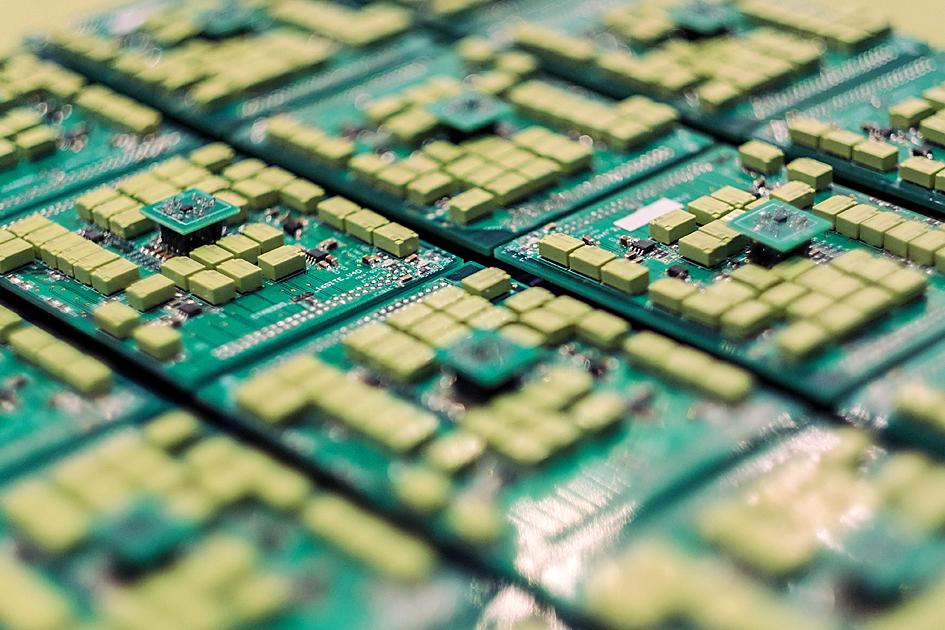Accumulated exports from the IC sector in the first eight months of the year were US$76.022 billion, up 21.6 percent from a year earlier and a record high for the period, Ministry of Finance data released yesterday showed.
The total value of the nation’s exports over the eight-month period reached US$217.38 billion, up 1.5 percent from last year, making Taiwan one of the few economies to retain growth momentum amid the COVID-19 pandemic, the ministry said.
The increase in overall export value was driven by strong growth in exports of electronic components and information and communication products, propelled by solid demand for emerging 5G technologies and work-from-home devices.

Photo: Billy HC Kwok, Bloomberg
This was offset by a decline in exports of some major products, the ministry said.
In the electronic components industry, the IC sector recorded US$11.285 billion in exports in August, up 20.4 percent from a year earlier, and a record single-month high, due mainly to rush shipments to Huawei Technologies Co (華為) ahead of new US sanctions against the Chinese tech giant.
In August, IC products made up 36.2 percent of Taiwan’s total exports.
Over the first eight months, the IC sector accounted for 35 percent of Taiwan’s total exports, also a record high, the data showed.
The strong growth in IC exports and the sector’s contribution to overall exports was due to strong demand for technology products and a steep fall in the export of old-economy products, such as plastics, minerals and machinery products as a result of the pandemic, ministry officials said.
The value of semiconductor equipment imports in August was US$1.9 billion, up 26.1 percent from a year earlier, the data showed.
For the first eight months, accumulated semiconductor equipment imports hit a record-high US$14.28 billion for the period, up 9.3 percent year-on-year, the data showed.
The nation’s semiconductor industry is expected to step up imports of equipment later this year, particularly high-end equipment from Japan and Europe, to improve its competitiveness, ministry officials said.
This trend has been spurred by US-China technology disputes, which has increased business opportunities in emerging technologies and for Taiwanese companies moving production back to Taiwan.
The anticipated increase in the purchase of semiconductor equipment is likely to boost Taiwan’s overall imports and cause greater exports, ministry officials said.

When an apartment comes up for rent in Germany’s big cities, hundreds of prospective tenants often queue down the street to view it, but the acute shortage of affordable housing is getting scant attention ahead of today’s snap general election. “Housing is one of the main problems for people, but nobody talks about it, nobody takes it seriously,” said Andreas Ibel, president of Build Europe, an association representing housing developers. Migration and the sluggish economy top the list of voters’ concerns, but analysts say housing policy fails to break through as returns on investment take time to register, making the

‘SILVER LINING’: Although the news caused TSMC to fall on the local market, an analyst said that as tariffs are not set to go into effect until April, there is still time for negotiations US President Donald Trump on Tuesday said that he would likely impose tariffs on semiconductor, automobile and pharmaceutical imports of about 25 percent, with an announcement coming as soon as April 2 in a move that would represent a dramatic widening of the US leader’s trade war. “I probably will tell you that on April 2, but it’ll be in the neighborhood of 25 percent,” Trump told reporters at his Mar-a-Lago club when asked about his plan for auto tariffs. Asked about similar levies on pharmaceutical drugs and semiconductors, the president said that “it’ll be 25 percent and higher, and it’ll

CHIP BOOM: Revenue for the semiconductor industry is set to reach US$1 trillion by 2032, opening up opportunities for the chip pacakging and testing company, it said ASE Technology Holding Co (日月光投控), the world’s largest provider of outsourced semiconductor assembly and test (OSAT) services, yesterday launched a new advanced manufacturing facility in Penang, Malaysia, aiming to meet growing demand for emerging technologies such as generative artificial intelligence (AI) applications. The US$300 million facility is a critical step in expanding ASE’s global footprint, offering an alternative for customers from the US, Europe, Japan, South Korea and China to assemble and test chips outside of Taiwan amid efforts to diversify supply chains. The plant, the company’s fifth in Malaysia, is part of a strategic expansion plan that would more than triple

Taiwanese artificial intelligence (AI) server makers are expected to make major investments in Texas in May after US President Donald Trump’s first 100 days in office and amid his rising tariff threats, Taiwan Electrical and Electronic Manufacturers’ Association (TEEMA, 台灣電子電機公會) chairman Richard Lee (李詩欽) said yesterday. The association led a delegation of seven AI server manufacturers to Washington, as well as the US states of California, Texas and New Mexico, to discuss land and tax issues, as Taiwanese firms speed up their production plans in the US with many of them seeing Texas as their top option for investment, Lee said. The